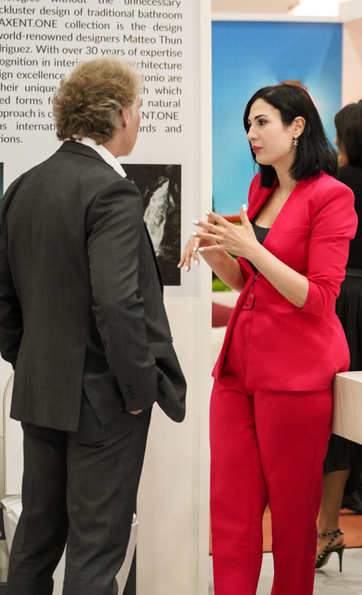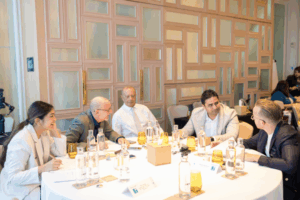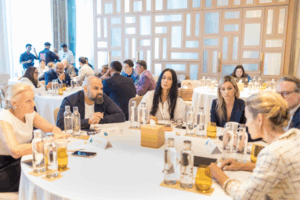Prototyping Hospitality’s Next Era: What Industry Leaders Shared at The Hotel Show 2026 Advisory Board
23 Oct. 2025
Earlier this month, The Hotel Show Advisory Board convened, bringing together global leaders and innovators shaping the future of hospitality. From investment and development to F&B innovation, wellness, and talent transformation the discussions set the stage for a forward-thinking and insight-led edition of The Hotel Show 2026.
As hospitality continues to evolve across the Middle East and beyond, our advisors explored how the industry can embrace innovation, manage risk, and unlock new growth opportunities.
Themes shaping the 2026 agenda
Investments, Development & Asset Management
With institutional capital growing in the region, risk management, mixed-use projects, and regulatory clarity are top of mind. Financing models, asset maturity, and ROI remain pressing priorities for both developers and operators.
The MENA hospitality market is projected to grow from around USD 286 billion in 2024 to about USD 310 billion in 2025, with a compound annual growth rate (CAGR) of ~6.7% out to 2032. Panelists emphasised that institutional capital in the region is becoming more sophisticated it’s no longer just about building new hotels but about refurbishments, asset-repositioning, mixed-use projects and optimising ROI.
One observation: in the UAE, hotel rooms are expected to rise to 217,853 by end 2025 and to 235,674 by 2030, signalling an upcoming shift from expansion to optimisation. Key questions raised: how to manage development risk, which financing models will hold up in the next cycle, and how operators can extend asset life / value rather than simply chasing new build.
Branded Residences
Branded residences in the MENA region have become a standout opportunity. According to data by Global Branded Residences, the region accounts for 36% of new global signings in this sector. The region holds 13% of global completed branded residential projects and 25% of the pipeline. Advisors discussed the trend away from hotel-linked residences to standalone branded homes (in MENA, 31% of completed are standalone; 51% of the pipeline). The conversation centered on: how to balance global brand cachet with locally relevant operations, how legal and contractual frameworks must evolve to protect investors, and how amenities must reflect market realities rather than generic luxury tropes.
F&B Concepts & Innovation
The F&B pillar was seen as both an engine of growth and an emerging pressure point. In the MENA region, luxury hospitality growth is modest (around 4 % in 2024) but fine dining outpaced that at 8 %.
- Automation and technology to overcome staffing challenges.
- The role of coffee culture and wellness-led dining as drivers of guest spend and differentiation.
- The increasing importance of drinks/beverage operations as standalone profit centres (not just add-ons).
- Linking commercial metrics: moving beyond traditional REVPAR to include TREVPAR and other revenue streams.
Advisors stressed that the operators who view F&B as part of the asset value chain (not just an amenity) will thrive.
Wellness & Lifestyle Hospitality
Wellness and lifestyle hospitality are emerging as core pillars rather than optional extras. The board highlighted that in projects like Amaala (Saudi Arabia), wellness is baked into the development from the start.
The challenge: creating genuine, place-based wellness (prevention, longevity, medical tourism) rather than superficial add-ons.
Speakers noted that consumers increasingly expect holistic wellness ecosystems rather than a spa visit. Commercial viability is critical, the model must integrate with operations, not just be a branding layer.
Alternative Stays & New Formats
Short-term rentals, serviced apartments, lean-luxury hotels and hybrid models are gaining traction in the MENA region. One advisor cited that MENA is becoming a global business-travel hotspot, with business travel in the region estimated at USD 18.1 billion in 2024 and expected to grow ~6.1% in 2025. Key themes: regulation (especially around short-term rentals), community integration (residents, local neighborhoods) and sustainability (resource, design, operations). The board emphasised that success for these formats will depend on how seamlessly they integrate into local ecosystems and how regulation adapts accordingly.
Talent, Education & Future Leaders
The next generation of hospitality professionals in MENA. With generational shifts (Gen Z entering the workforce), the board discussed how education, career paths and leadership models must adapt.
- Designing curriculums that reflect digital, experiential and sustainable hospitality.
- Balancing careers in SMEs versus multinational groups.
- Embedding purpose and sustainability into leadership values so that future leaders are aligned with both business and environmental/social expectations.











